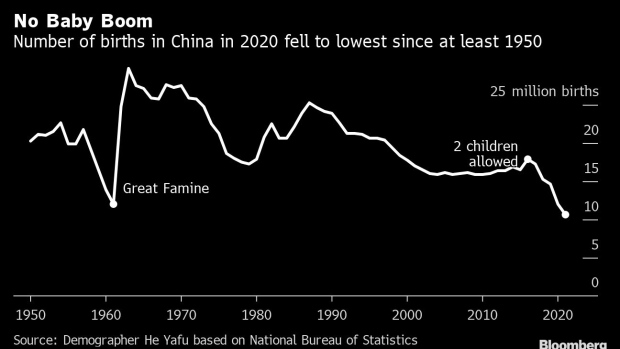Pretty weak response from an authoritarian government, unfortunately. This is the one area where they can use their blunt hammer to fix this problem but they won't. Are they afraid of getting overthrown if they implement a ban on contraceptives and abortions?What would you suggest to urgently solve this?
Personally my nuclear option (only to be used as the last measure) is banning contraceptives and the last but most devasting action would be making non-marital s*x illegal in order to force everyone into marriage (even if they don't want to).
Or ban abortion
That's it.
Either births will increase due to other actions taken by the government or nuclear option will be deployed.
Or it does nothing and allows births to decline to 9, then 8 then 7 million by 2030
You are using an out of date browser. It may not display this or other websites correctly.
You should upgrade or use an alternative browser.
You should upgrade or use an alternative browser.
China demographics thread.
- Thread starter gadgetcool5
- Start date
- Status
- Not open for further replies.
They already smashed down the leeches of the private education centres.This is the one area where they can use their blunt hammer to fix this problem but they won't
Then they started deleveraging the property sector which stabilised and then decreased house prices.
These are strong actions which no Democratic government would take.
These are nuclear options. I think they will use other measures before going for the last resort measures.Are they afraid of getting overthrown if they implement a ban on contraceptives and abortions?
However more actions needs to be taken. We will see in 2022 data if the 2021 actions had any effect at all. (Private edu sector annihilation, and house prices decreased)
I find all the reasoning about culture and spending habits in this thread to be lazy thinking. If it were as simple as banning some things, then every country would have done it already.Why are poorer countries in Chinas periphery like the Philippines, Vietnam, Indonesia, Malaysia and African countries aren not having any issues when it comes to their fertility? It seems that economic development and high incomes make people more buget conscious or their spending habits become more materialistic, hedonistic, nihilistic and not geared towards creating or having a family.
The issue of low fertility rates are a developed countries problem which is why they have a pretty robust immigration which then causes conflict or issues with the majority population.
You are having trouble reasoning why higher average income countries have a lower fertility rate than lower average income countries. A simple reason for this is that the income expectations for a child scales with the parent's income. That is to say the higher income country has higher expectations for a child than the lower income country.
GDP per Capita (because average income data is inconsistent/poor/non-existent for some of the countries):
Vietnam: 2,785 USD
Malaysia: 10,401 USD
Indonesia: 3,869 USD
Philippines: 3,298 USD
China: 10,500 USD
Shanghai: 22,560 USD
Beijing: 23,908 USD
Guangdong: 20,887 USD (126,012,510 people)
Let's suppose that income is correlated to GDP per Capita. That is to say the average child born in Guangdong province right now is expected to produce on average 7 times more than the average child born in Vietnam. Even if Vietnam's GDP per Capita doubled to ~5,600 USD and so did income, then it would still be just a bit over a quarter of Guangdong province's GDP per Capita. To increase a child's future productivity more resources/money needs to be invested in the child (aka increasing the cost of raising a child). That is to say increasing living standards also increases the cost of raising a child. So raising a child in a low income country is no longer totally comparable to raising a child in a high income country.
A naive solution is to just consume more resources/money per child (aka have the government or parents spend more money on children). But one quickly realizes that there are physical resources limits such as limited farmland, limited natural resources, excessive pollution due to industrialization, climate change, limited school slots, limited jobs, etc. Of course such limits are not absolute and technology can help increase these limits. For example, the Green Revolution (great increase in production of food grains in developing countries) in the 1950s and 1960s corresponded with a massive baby boom. But there is also no guarantees that a society can sustainably increase resource limits to match an increased population and improved living standards.
Having said all that is demographic decline permanant? Nope. The most famous is example of this is France. In 1907 France's population peaked at 40,400,000 and dropped to a low of 38,500,000 in 1920. It was not until ~20 years later in 1929 that the population returned to 40,500,000. Today France's population is 65,200,000 and this was in large part due to the 1950s and 1960s. So the lessons from this scenario are:
(1) Demographic trends take decades to change. There are no quick and easy solutions and scapegoats to demographics like some people in this thread want.
(2) Nobody in 1907 France could/would have predicated the 1950s and 1960s baby boom. Sometimes the future changes to demographics are outside the control of the government and simply unpredictable.
Why are poorer countries in Chinas periphery like the Philippines, Vietnam, Indonesia, Malaysia and African countries aren not having any issues when it comes to their fertility? It seems that economic development and high incomes make people more buget conscious or their spending habits become more materialistic, hedonistic, nihilistic and not geared towards creating or having a family.
The issue of low fertility rates are a developed countries problem which is why they have a pretty robust immigration which then causes conflict or issues with the majority population.
Actuall,Vietnam population is ageing at a very fast pace
If China's demograph problem really is that bad and need to be fixed urgently,then why the authority still refuse to abolish the “X number of children is allowed” policy completely?
I always hear people saying that even the government now allow familys to have 3 children,very few people want to have children at all. While that is true,but the question is:why does the authority still feels that there need to be a cap?what's the point of this policy as of today?Is there any political reason which makes the authority feel uncomfortable to remove this policy at once ?
I always hear people saying that even the government now allow familys to have 3 children,very few people want to have children at all. While that is true,but the question is:why does the authority still feels that there need to be a cap?what's the point of this policy as of today?Is there any political reason which makes the authority feel uncomfortable to remove this policy at once ?
There is no penalty for having forth and fifth children in China anymore. Telling people to have 3 children isn't equal to prohibit people from having more. Family planning is just another way to fight poverty. Many extremely rural and mountainous region in China, women were still having many children but these children end up in poverty and perpetuate a vicious cycle of being poor, forcing to marry in early age, having too many children, children growing up in poverty etc.If China's demograph problem really is that bad and need to be fixed urgently,then why the authority still refuse to abolish the “X number of children is allowed” policy completely?
I always hear people saying that even the government now allow familys to have 3 children,very few people want to have children at all. While that is true,but the question is:why does the authority still feels that there need to be a cap?what's the point of this policy as of today?Is there any political reason which makes the authority feel uncomfortable to remove this policy at once ?
My guess is they don't want to admit that the one child policy and population control in general was a mistake in the first place. If they remove population control abruptly, it can be seen as an admission of this mistake. I hope I'm wrong and the CCP has some secret plan but I think they're just stubborn at this point.If China's demograph problem really is that bad and need to be fixed urgently,then why the authority still refuse to abolish the “X number of children is allowed” policy completely?
I always hear people saying that even the government now allow familys to have 3 children,very few people want to have children at all. While that is true,but the question is:why does the authority still feels that there need to be a cap?what's the point of this policy as of today?Is there any political reason which makes the authority feel uncomfortable to remove this policy at once ?
- Status
- Not open for further replies.



